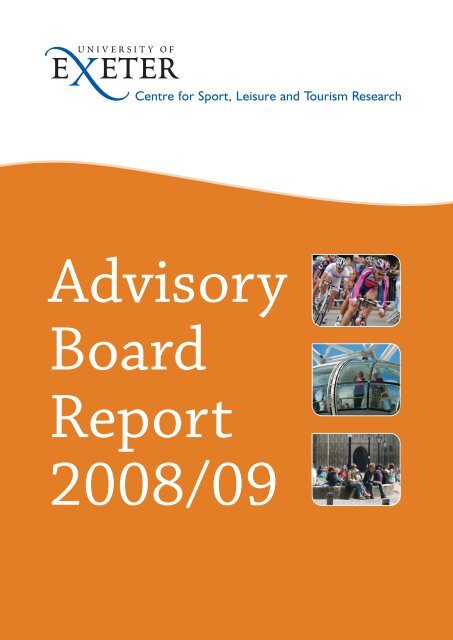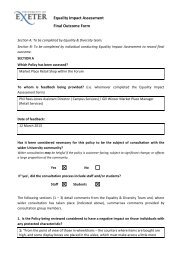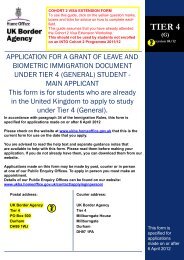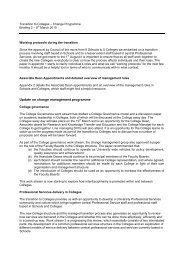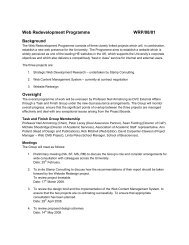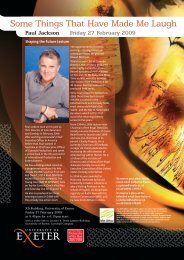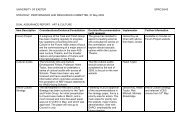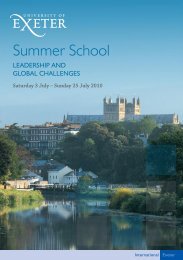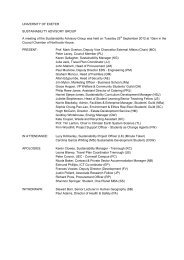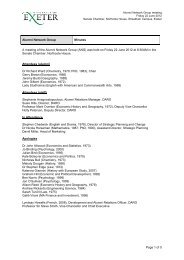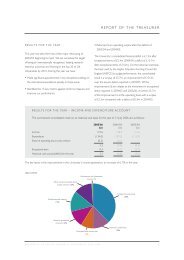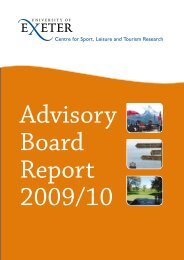Advisory Board Report 2008-09 - University of Exeter
Advisory Board Report 2008-09 - University of Exeter
Advisory Board Report 2008-09 - University of Exeter
You also want an ePaper? Increase the reach of your titles
YUMPU automatically turns print PDFs into web optimized ePapers that Google loves.
<strong>Advisory</strong><br />
<strong>Board</strong><br />
<strong>Report</strong><br />
<strong>2008</strong>/<strong>09</strong>
Contents<br />
Introduction 1<br />
The Capacity Building Cluster Scheme 2<br />
Knowledge Exchange Activities 5<br />
Major Thematic Priorities 8<br />
Management, Governance and the <strong>Advisory</strong> <strong>Board</strong> 10<br />
Members <strong>of</strong> the <strong>Advisory</strong> <strong>Board</strong> 12<br />
<strong>2008</strong>/<strong>09</strong> in Focus: Targets 13<br />
<strong>2008</strong>/<strong>09</strong> in Focus: Research and Knowledge Exchange Activities 14<br />
<strong>2008</strong>/<strong>09</strong> in Focus: Achievements 16<br />
20<strong>09</strong>/10 Objectives Moving Forward 19<br />
Questions for the <strong>Advisory</strong> <strong>Board</strong> 20
Introduction<br />
Welcome to the first meeting <strong>of</strong> the <strong>Advisory</strong> <strong>Board</strong> for<br />
the Centre for Sport, Leisure and Tourism Research. The<br />
<strong>University</strong> <strong>of</strong> <strong>Exeter</strong> has long and distinguished track-records<br />
in the areas <strong>of</strong> sport and tourism. In the latest Research<br />
Assessment Exercise in <strong>2008</strong>, the School <strong>of</strong> Sport and Health<br />
Sciences at the St Luke’s campus was rated sixth in the UK<br />
for the standing <strong>of</strong> its work. For over two decades <strong>Exeter</strong> has<br />
been at the cutting edge <strong>of</strong> tourism studies. The <strong>University</strong> is<br />
home to one <strong>of</strong> the largest and most visible doctoral training<br />
centres in the world, and its academics have published several<br />
subject-defining studies in the field.<br />
The new Centre for Sport, Leisure and Tourism Research is a<br />
university research centre that consolidates our reputation as<br />
an international leader in these connected fields. The Centre<br />
is supported by a major investment <strong>of</strong> £1.5 million from the<br />
Economic and Social Research Council as part <strong>of</strong> its Capacity<br />
Building Cluster scheme. Over the next five years, the Centre<br />
will set out to build research capacity among graduate students,<br />
post-doctoral scholars, early career and established academics<br />
to coincide with the preparations for, and legacy period after,<br />
the 2012 Olympic Games. Since the launch <strong>of</strong> the Centre<br />
in September <strong>2008</strong>, we have already had several notable<br />
successes which are reported in this report produced by the<br />
Director, Pr<strong>of</strong>essor Coles, and his colleagues.<br />
The <strong>University</strong> <strong>of</strong> <strong>Exeter</strong> occupies a position among the top-10<br />
universities in the UK, according to The Times Good <strong>University</strong><br />
Guide. As a leading research-intensive university we have<br />
ambitious plans for growing our research portfolio in the next<br />
few years.<br />
We would like to take this opportunity to thank you for<br />
taking time to contribute to our work and to our future. Your<br />
contribution is vital. Impact is the current emphasis moving<br />
forward. Now more than ever, higher education has to engage<br />
with users to ensure research and training remains relevant<br />
and meaningful to the world in which we live. As experts in<br />
the areas <strong>of</strong> sport, leisure and tourism, we trust you will find<br />
much <strong>of</strong> interest in this report and an opportunity to contribute<br />
to the future <strong>of</strong> a vibrant, dynamic and important beacon <strong>of</strong><br />
research activity at this university and a facility which we think<br />
will become a major resource for the country at large.<br />
Pr<strong>of</strong>essor Roger J P Kain<br />
Deputy Vice-Chancellor (Research and Knowledge Transfer)<br />
An international reputation<br />
in sport, leisure and<br />
tourism<br />
Deputy Vice-Chancellor Pr<strong>of</strong>essor Roger Kain.<br />
1
2 <strong>Advisory</strong> <strong>Board</strong> <strong>Report</strong> <strong>2008</strong>/<strong>09</strong><br />
3<br />
The Capacity Building Cluster Scheme<br />
Sport, leisure and tourism are major features in economy, society and culture in the United<br />
Kingdom. They are also fields that research grant and training schemes in higher education<br />
have traditionally overlooked.<br />
With the 2012 Olympic Games on the horizon, the Economic<br />
and Social Research Council (ESRC) recognised both the<br />
importance <strong>of</strong> these connected sectors and <strong>of</strong> developing<br />
greater high-level research capacity within and across them. As<br />
a non-departmental public body, the ESRC is charged on behalf<br />
<strong>of</strong> government with ensuring that the UK is world-leading in its<br />
social sciences.<br />
In 2007, the ESRC published details <strong>of</strong> a new scheme aimed<br />
at delivering research and training in order to ensure longterm<br />
provision in several key business sectors and subjects<br />
<strong>of</strong> national need. One thematic priority was sport, leisure<br />
and tourism. The so-called ‘Capacity Building Cluster’ (CBC)<br />
scheme aimed to address research and training capacity<br />
at doctoral and post-doctoral levels. In particular, it set out<br />
to establish centres <strong>of</strong> excellence to encourage the further<br />
development <strong>of</strong>, and to capitalise more fully on, the skills,<br />
knowledge and experience <strong>of</strong> graduate students, post-doctoral<br />
scholars, early career and established academics. Pockets <strong>of</strong><br />
excellence exist among many higher education institutions<br />
(HEIs) in the fields covered by the CBCs. However, the<br />
scheme was designed to facilitate collaboration among groups<br />
<strong>of</strong> academics working within and across HEIs in order to add<br />
Over the period <strong>2008</strong> - 2013<br />
the ESRC invested £1.5 million<br />
in the Centre<br />
value to research and training by creating synergies through<br />
new working relationships.<br />
So that current and future experts will be equipped with<br />
relevant skills and knowledge to the sectors they study, the<br />
ESRC required engagement with external partners in the<br />
co-production <strong>of</strong> research and training. Key to the success <strong>of</strong><br />
a CBC was to be its engagement with end users on activities<br />
which were to be clearly beneficial to them. Central<br />
government education policy in recent times has repeatedly<br />
encouraged greater knowledge exchange between HEIs and<br />
external partners in the private, public and voluntary sectors in<br />
the social sciences (as well as other disciplines).<br />
As the only university in the UK to be accredited by the ESRC<br />
for its training in tourism, with outstanding research records in<br />
sport and tourism, and with a critical mass <strong>of</strong> researchers in the<br />
connected fields, <strong>Exeter</strong> was well-placed to establish a CBC in<br />
sport, leisure and tourism.<br />
Dave Brailsford, mastermind <strong>of</strong> cycling success at Beijing <strong>2008</strong>, is in demand from business for his insights on managing performance.
4 <strong>Advisory</strong> <strong>Board</strong> <strong>Report</strong> <strong>2008</strong>/<strong>09</strong><br />
5<br />
Six CBCs were eventually funded in spring <strong>2008</strong>: four in<br />
business sectors and two in the voluntary sector. The Capacity<br />
Building Cluster at <strong>Exeter</strong> was the only one dedicated to, and<br />
funded in, sport, leisure and tourism. In total over the period<br />
from <strong>2008</strong> to 2013, the ESRC invested £1.5 million in order<br />
to:<br />
• Deepen knowledge and understanding in sport, leisure and<br />
tourism through advanced research;<br />
• Build capacity in these areas by training, developing and<br />
supporting the next generation <strong>of</strong> researchers; and<br />
• Improve the practices and international standing <strong>of</strong><br />
businesses and organisations through sustained engagement<br />
and knowledge transfer activities.<br />
As a result <strong>of</strong> this major investment, <strong>Exeter</strong> became the ESRC’s<br />
national centre <strong>of</strong> excellence in sport, leisure and tourism<br />
providing both research training at masters and doctoral level,<br />
as well as advanced postgraduate and post-doctoral research.<br />
The CBC is located in the South West <strong>of</strong> England because <strong>of</strong><br />
the regional importance <strong>of</strong> the sectors. However, its facilities<br />
for research and knowledge transfer are available to potential<br />
partners from all parts <strong>of</strong> the UK.<br />
‘CBC’ is a cumbersome term and it does not resonate well<br />
outside academia. To reflect the nature <strong>of</strong> the award and as a<br />
statement <strong>of</strong> its future intent, in autumn <strong>2008</strong> the <strong>University</strong><br />
<strong>of</strong> <strong>Exeter</strong> established the new Centre for Sport, Leisure and<br />
Tourism Research with two main mutually-reinforcing aims:<br />
first, to deliver the programme <strong>of</strong> work from the CBC grant;<br />
and second, to provide a platform for additional, sustainable<br />
knowledge exchange activity beyond the core grant funding.<br />
This first report outlines progress made by the Centre in<br />
<strong>2008</strong>/<strong>09</strong>. It sets out our achievements since the grant started<br />
on 15 September <strong>2008</strong> and it benchmarks our progress against<br />
our early targets agreed with the ESRC. Relevant background<br />
and context is provided including how the various components<br />
<strong>of</strong> the CBC investment operate as well as the governance and<br />
management <strong>of</strong> the Centre. Plans for 20<strong>09</strong>/10 are outlined.<br />
Input from the <strong>Advisory</strong> <strong>Board</strong> would be especially helpful<br />
with respect to enhancing the performance <strong>of</strong> the Centre and<br />
the ESRC’s investment. To this end, the last part <strong>of</strong> the report<br />
includes a series <strong>of</strong> questions that are intended to help shape<br />
discussions when the <strong>Advisory</strong> <strong>Board</strong> meets in <strong>Exeter</strong> on 24<br />
November 20<strong>09</strong>.<br />
<strong>Exeter</strong> is the only UK<br />
university with ESRC-<br />
accreditation for doctoral<br />
training in tourism<br />
Knowledge Exchange Activities<br />
The core grant funding from the ESRC currently allows the Centre to conduct four types <strong>of</strong><br />
research and training in the areas <strong>of</strong> sport, leisure and tourism. These vary in terms <strong>of</strong> their<br />
purpose, scope for knowledge transfer, and availability to prospective partners and users.<br />
CASE studentships<br />
Funding Business Partner contributes £4k per annum<br />
ESRC contributes c £19k per annum<br />
Duration 3 years<br />
Available to Public, private and voluntary sector partners<br />
Description CASE Studentships give PhD students an<br />
opportunity to gain experience <strong>of</strong> work outside<br />
academia through collaboration with businesses<br />
or organisations on research problems relevant<br />
to the partner. Academic and company<br />
supervisors support the student.<br />
Knowledge Transfer Partnerships<br />
Funding Business Partner contributes c.£35k<br />
(SMEs: c £20k) per annum<br />
ESRC funds balance <strong>of</strong> the operating budget<br />
(total cost £63k pa)<br />
Duration up to 2 years (as part <strong>of</strong> the CBC scheme)<br />
Available to Private and voluntary sector partners<br />
Description An opportunity for an organisation to achieve<br />
strategic change through partnering with<br />
academics who apply their expertise. A high<br />
calibre graduate or postgraduate is placed within<br />
the organisation with regular supervision from a<br />
company and academic supervisor. Administrative<br />
support is provided by the university.<br />
Business Vouchers<br />
Funding Provided in whole by the ESRC (worth £3,000)<br />
Duration Up to 1 year<br />
Available to Private sector partners, with no prior<br />
engagement with higher education<br />
Description Business Vouchers enable SMEs to take their first<br />
steps with higher education. SMEs can apply for<br />
a voucher to be used at the <strong>University</strong> <strong>of</strong> <strong>Exeter</strong>,<br />
<strong>University</strong> <strong>of</strong> Plymouth, <strong>University</strong> <strong>of</strong> Bristol or<br />
<strong>University</strong> <strong>of</strong> Bath to fund short-term academic<br />
consultancy, access research relevant to their<br />
business, or to frame questions that might be<br />
addressed through new, additional research.<br />
This is without the normal financial demands on<br />
the organisation.<br />
Business Placements<br />
Funding Provided in whole by the ESRC (bursaries <strong>of</strong> up<br />
to £7,000 for students)<br />
Duration Up to 3 months<br />
Available to Private, public and voluntary sector partners<br />
Description Existing ESRC-funded PhD students work on a<br />
specific short-term project towards an<br />
organisational research output. Aimed at partners<br />
with specific needs who may benefit from<br />
short-term help, including recruiting appropriate<br />
students, all at no direct cost to the organisation.
6 <strong>Advisory</strong> <strong>Board</strong> <strong>Report</strong> <strong>2008</strong>/<strong>09</strong><br />
7<br />
The grant funding originally contained provision for 15 CASE<br />
Awards, six KTPs <strong>of</strong> two-year duration, 15 Business Vouchers<br />
and seven Business Placements. Simply put, funding is set aside<br />
by the ESRC for the Centre to access when appropriate and<br />
relevant cases are made.<br />
Beyond these core activities Centre members and their<br />
partners may additionally apply to other knowledge exchange<br />
and business engagement schemes funded by the ESRC and<br />
the other research councils. For instance, the Centre has<br />
also been successful in attracting two grants <strong>of</strong> over £85k<br />
from the ESRC’s Business Engagement Grant scheme, with<br />
Flybe (<strong>2008</strong>/<strong>09</strong>) and South West Tourism (20<strong>09</strong>/10) as the<br />
respective external lead partners. These have examined issues<br />
<strong>of</strong> corporate social responsibility among low fares airlines (with<br />
Flybe) as well as issues <strong>of</strong> climate change mitigation and its<br />
relationship to business innovation in the tourism sector (with<br />
Southwest Tourism).<br />
CASE awards and KTPs comprise the majority <strong>of</strong> the ESRC<br />
funding available to the centre; both require the partners to<br />
make a contribution to the programme <strong>of</strong> work; and both<br />
International scholarship and<br />
practical, actionable outputs<br />
for partners<br />
yield considerable return on investment (ROI) for the external<br />
partner. For CASE studentships the ESRC contributes £57k<br />
in total over three years, while the partner is expected to<br />
contribute £4k per year (4.8 ROI). For a two-year KTP, an SME<br />
partner is expected to contribute £40k to a total project budget<br />
<strong>of</strong> £139k (3.5 ROI) at local pricing (which is slightly different to<br />
the standard market rates advertised by the ESRC nationally).<br />
While partners are not necessarily expected to make a cash<br />
contribution to the Business Placement or Business Voucher<br />
Scheme, they are strongly encouraged to make an in-kind<br />
contribution.<br />
Each type <strong>of</strong> activity is expected to yield academic outcomes<br />
(eg a successful PhD thesis and/or journal papers) as well as<br />
deliverables for the external business or organisation (eg new<br />
data, reports, seminars, briefings, systems, solutions). An<br />
important common denominator throughout the schemes<br />
is direct engagement with partners in the public, private and<br />
voluntary sectors. Training and research funded by the CBC<br />
grant has to be in response to the knowledge needs <strong>of</strong> external<br />
partners.<br />
Clearly, it is necessary to balance the needs <strong>of</strong> different<br />
stakeholders in each piece <strong>of</strong> work. In the context <strong>of</strong> its<br />
business engagement agenda, the combination <strong>of</strong> activity in this<br />
major investment will, for the ESRC:<br />
• provide a national point-<strong>of</strong>-contact for business and<br />
organisations to access sector-specific research and<br />
knowledge<br />
• make available an array <strong>of</strong> opportunities to meet the needs<br />
<strong>of</strong> a diverse range <strong>of</strong> potential partners, in particular those<br />
working with higher education for the first time<br />
• facilitate relationships and partnerships to address<br />
longer-term strategic goals in businesses and organisations<br />
The Eden Project is instantly recognisable as a symbol <strong>of</strong> tourism expertise in the South West.<br />
• improve the knowledge base through the development <strong>of</strong><br />
a skilled, pr<strong>of</strong>essional workforce which sees research-<br />
informed practice as the norm.<br />
The nature <strong>of</strong> the ESRC investment means that potential<br />
partners from throughout the UK may benefit from the CBC<br />
funding although geography may have dissuaded them in the<br />
past from considering <strong>Exeter</strong> as their first port <strong>of</strong> call for their<br />
research and training needs. Nevertheless, the Centre aims to<br />
disseminate findings from cutting-edge work to businesses and<br />
organisations throughout the UK from a leading region in sport,<br />
leisure and tourism.<br />
The Jamie Oliver inspired restaurant Fifteen Cornwall is an example <strong>of</strong> how the South West leads trends in the leisure sector.<br />
Photographer: Bob Berry
8 <strong>Advisory</strong> <strong>Board</strong> <strong>Report</strong> <strong>2008</strong>/<strong>09</strong><br />
9<br />
Major Thematic<br />
Priorities<br />
Work in the Centre has to be relevant to external users. The selection <strong>of</strong> projects to be funded<br />
by the CBC grant is guided by six thematic priorities that reflect sectoral trends and crosscutting<br />
policy in sport, leisure and tourism moving forward. Applications are expected to<br />
contribute toward deepening understanding and building future capacity in one or more <strong>of</strong><br />
the following areas:<br />
(a) Sport, Health and Well-being<br />
Beyond their economic role, sport, leisure and tourism<br />
deliver important social, health and cultural gains.<br />
Projects connected to this strand <strong>of</strong> work will explore how<br />
sport and leisure activity is important to the delivery<br />
<strong>of</strong> major gains in public health and workplace productivity.<br />
In addition to organised sport, this work may cover such<br />
issues as informal physical activity and leisure opportunities<br />
(eg, skateboarding, free running, walking and cycling)<br />
which engage young people and contribute significantly<br />
to overall participation rates.<br />
(b) Sport, Leadership and Policy<br />
This strand explores how current thinking and best<br />
practice in leadership can inform the delivery <strong>of</strong><br />
sporting opportunities and performance organisationally<br />
and individually. It focuses on how our understandings <strong>of</strong><br />
leadership can address policy objectives, for instance both<br />
as the driver for excellence in elite sports and greater basic<br />
engagement among young people towards greater public<br />
health.<br />
Participation doesn’t have to mean formal, structured exercise. The nature <strong>of</strong> the landscape supports and enhances our experiences <strong>of</strong> sport, leisure and tourism.<br />
(c) Innovation, Knowledge Creation and<br />
Knowledge Transfer<br />
Work in this strand will examine the way in which<br />
organisations in sport, leisure and tourism innovate and<br />
transfer knowledge, and how these processes translate<br />
into such outcomes as the creation <strong>of</strong> greater value,<br />
business and organisational competitiveness, and sector<br />
sustainability.<br />
(d) Service Processes and Operations<br />
Experience is at the heart <strong>of</strong> success in sport, leisure and<br />
tourism. Current policy and practice extol the importance<br />
<strong>of</strong> enhancing quality as the basis for product and<br />
experience. Projects in this strand will point to the gains to<br />
be made from moving from the more process-based<br />
views to understanding and improving service relationships<br />
and operations.<br />
(e) Travel, Transport and Sustainability<br />
Sport, leisure and tourism generate thousands <strong>of</strong> trips<br />
among participants and spectators, they contribute greatly<br />
to the load placed on transport infrastructure and services,<br />
and they have implications for climate change and<br />
strategies for reducing carbon emissions. Work connected<br />
to this strand will, for instance, investigate the use <strong>of</strong><br />
different modes <strong>of</strong> transport as well as resource (energy)<br />
implications and the environmental load <strong>of</strong> leisure.<br />
(f) Environment, Landscape and Space<br />
Activity in this strand will examine the way in which<br />
the built and natural environment function to support and<br />
enhance sport, leisure and tourism. This ranges from<br />
<strong>of</strong>fering both formal and informal spaces for sport and<br />
leisure, to the organisation <strong>of</strong> local supply chains to reduce<br />
the carbon footprint and food miles <strong>of</strong> events.<br />
Work outside these broad categories is not excluded from<br />
consideration. However, the six areas are intended to reflect<br />
major trends in policy and practice in sport, leisure and tourism<br />
that should necessarily and appropriately be addressed by a<br />
dedicated cross-sectoral research and training centre.<br />
Moreover, our strategy is intended to deliver distinctive<br />
strands <strong>of</strong> work that, in turn, derive greater impact for much<br />
wider sets <strong>of</strong> beneficiaries. Not only will individual projects<br />
reap the rewards <strong>of</strong> greater synergies, overlaps and mutual<br />
reinforcement, but also they will be able to deliver new<br />
knowledge and training <strong>of</strong> use and relevance to organisations<br />
beyond the contracted partner.
10 <strong>Advisory</strong> <strong>Board</strong> <strong>Report</strong> <strong>2008</strong>/<strong>09</strong><br />
11<br />
Management, Governance<br />
and the <strong>Advisory</strong> <strong>Board</strong><br />
The Centre for Sport, Leisure and Tourism Research is operated under the same principles <strong>of</strong><br />
dual assurance that are used throughout the <strong>University</strong> <strong>of</strong> <strong>Exeter</strong>.<br />
Membership <strong>of</strong> the Centre is open to staff at the <strong>University</strong><br />
<strong>of</strong> <strong>Exeter</strong> with expertise in research and knowledge transfer<br />
in sport, leisure and tourism. Since establishment, over 15<br />
academics have been involved in developing projects under the<br />
auspices <strong>of</strong> the Centre. Members span the social sciences and<br />
come from the:<br />
• <strong>University</strong> <strong>of</strong> <strong>Exeter</strong> Business School (UEBS)<br />
• School <strong>of</strong> Geography (GEO)<br />
• School <strong>of</strong> Humanities and Social Sciences (HuSS)<br />
• School <strong>of</strong> Psychology (PSYCH)<br />
• School <strong>of</strong> Sport and Health Sciences (SHS).<br />
The Centre is hosted by the Business School which provides<br />
administrative leadership. Support on external engagement<br />
is provided by the Research and Knowledge Transfer Office<br />
(RKT), a central facility <strong>of</strong> the <strong>University</strong> <strong>of</strong> <strong>Exeter</strong>.<br />
Daily operations are managed by a core team comprising the<br />
Director, Pr<strong>of</strong>essor Tim Coles (UEBS), and Manager, Jessica<br />
Craib (RKT), with their respective deputies, Pr<strong>of</strong>essor Roger<br />
Eston (SHS) and Dr Andy Richards (RKT).<br />
The core team reports to the termly Management <strong>Board</strong> that<br />
functions to monitor and evaluate the ongoing operation <strong>of</strong> the<br />
centre, its packages <strong>of</strong> work, and its finances. It is responsible<br />
for reviewing and adjusting targets for activity in the areas <strong>of</strong><br />
research, dissemination and communications to ensure the<br />
centre remains responsive to changing conditions in society<br />
and economy. The Management <strong>Board</strong> provides the ESRC<br />
with formal updates and feedback on the operation <strong>of</strong> this<br />
Centre within the Capacity Building Clusters scheme.<br />
The Management <strong>Board</strong> is chaired by the Deputy Vice-<br />
Chancellor for the Business School and for Sport, Pr<strong>of</strong>essor<br />
Neil Armstrong. Beyond the core team, the membership<br />
comprises the seven other senior academics who authored<br />
the application while the Director <strong>of</strong> the Business School<br />
(Pr<strong>of</strong>essor Richard Lamming) and the ESRC’s Senior Policy<br />
Manager (David Ridley) are ex-<strong>of</strong>ficio members. The<br />
Management <strong>Board</strong> has to make its first formal report to the<br />
ESRC in Spring 2010.<br />
The annual <strong>Advisory</strong> <strong>Board</strong> operates in parallel to the<br />
Management <strong>Board</strong>. It is intended to ensure that the Centre<br />
is meeting its objectives more broadly as well as responding<br />
to sector needs and new developments. The <strong>Advisory</strong> <strong>Board</strong><br />
serves five main roles <strong>of</strong> governance and oversight in so far as<br />
it is invited to:<br />
• advise on latest sector developments and priorities to<br />
ensure the centre remains responsive to sector needs<br />
• appraise the continuing relevance <strong>of</strong> the key priorities and,<br />
where necessary, suggest alternatives or additions<br />
• consider and comment on emerging projects, outcomes<br />
and outputs as part <strong>of</strong> the portfolio <strong>of</strong> activity<br />
• monitor and comment on the operation <strong>of</strong> the Centre<br />
against its aims and objectives, and those <strong>of</strong> the ESRC<br />
Business Engagement scheme<br />
• advise on the potential to sustain the Centre beyond the<br />
initial five-year ESRC-funding period.<br />
The <strong>Advisory</strong> <strong>Board</strong> receives this report and its business will<br />
be received by the Management <strong>Board</strong> formally at its spring<br />
meeting. The first formal report to the ESRC based on its key<br />
performance indicators for government will be submitted by<br />
the Management <strong>Board</strong> and informed by the <strong>Advisory</strong> <strong>Board</strong>’s<br />
views. The report to the ESRC (and the ESRC’s response) will<br />
be communicated to the next <strong>Advisory</strong> <strong>Board</strong> in Autumn 2010.<br />
The Centre for Sport, Leisure and Tourism Research is an initiative <strong>of</strong> the <strong>University</strong> <strong>of</strong> <strong>Exeter</strong> Business School and ESRC. The Centre was launched at the Innovation Centre in October <strong>2008</strong>.
12 <strong>Advisory</strong> <strong>Board</strong> <strong>Report</strong> <strong>2008</strong>/<strong>09</strong><br />
13<br />
Members <strong>of</strong> the <strong>Advisory</strong> <strong>Board</strong><br />
The membership <strong>of</strong> the <strong>Advisory</strong> <strong>Board</strong> is intended to reflect the range <strong>of</strong> interests covered<br />
by the Centre as well as the diversity <strong>of</strong> stakeholders in sport, leisure and tourism across the<br />
public, private and voluntary sectors. Academic oversight is also necessary to ensure that<br />
world-class scholarship accompanies a high standard <strong>of</strong> end-user engagement and impact.<br />
Membership also embodies the duality <strong>of</strong> the Centre as a<br />
national investment but based in a region notable for its major<br />
achievements in, and contributions to, sport, leisure and<br />
tourism in the United Kingdom. The Centre would like to<br />
conduct projects with partners in other important locations and<br />
destinations in the UK, but it recognises that projects it pursues<br />
in the South West must have resonance to, and relevance for,<br />
businesses and organisations in other parts <strong>of</strong> the country.<br />
The current members <strong>of</strong> the <strong>Advisory</strong> <strong>Board</strong> are:<br />
Mr Malcolm Bell – Chief Executive <strong>of</strong> Southwest Tourism<br />
Moray Bowater – Managing Director <strong>of</strong> Helpful Holidays<br />
Dr Tim Crowhurst – Department <strong>of</strong> Culture, Media and Sport<br />
(Tourism Division)<br />
Leanne Dingle – Director, Regional Legacy in Arts and Youth<br />
Sport, HERDA-SW<br />
Niall Duffy – Head <strong>of</strong> PR and Public Affairs, Flybe<br />
Dr Steven Freudmann – Chair, Institute for Travel and Tourism<br />
Dr Alan Fyall – Head <strong>of</strong> Enterprise, Bournemouth <strong>University</strong><br />
Guy Lavender – South West Director for the 2012 Games,<br />
Team South West<br />
Maureen McAllister – Head <strong>of</strong> Culture and Tourism, South<br />
West <strong>of</strong> England Regional Development Agency<br />
Jenny McGee – Head <strong>of</strong> Strategy, Visit England<br />
David Ridley – Senior Policy Manager, Economic and Social<br />
Research Council<br />
Ged Roddy – Director <strong>of</strong> Sport, <strong>University</strong> <strong>of</strong> Bath. Also<br />
Vice-Chair, Sport England; <strong>Board</strong> Member, UK Sport; Chair,<br />
Regional Sports <strong>Board</strong> South West.<br />
Also attending are:<br />
Pr<strong>of</strong>essor Roger Kain, Deputy Vice-Chancellor, Research and<br />
Knowledge Transfer (Chair <strong>of</strong> <strong>Advisory</strong> <strong>Board</strong>)<br />
Pr<strong>of</strong>essor Tim Coles, Director <strong>of</strong> the Centre for Sport, Leisure<br />
and Tourism Research and Principal Investigator for the ESRC<br />
CBC Grant<br />
As the UK’s most successful regional airline, Flybe has its headquarters in <strong>Exeter</strong> where it employs over 1,000 people.<br />
<strong>2008</strong>/<strong>09</strong> in Focus: Targets<br />
Prior to the start <strong>of</strong> the grant, the Centre was invited to enter an implementation plan<br />
covering the first 18 months <strong>of</strong> its work. For the sake <strong>of</strong> simplicity, deliverables have<br />
been divided into the broad categories <strong>of</strong> knowledge exchange activities and supporting<br />
infrastructure.<br />
Proposed Knowledge Exchange Activities<br />
By the end <strong>of</strong> the first year, we planned to recruit and<br />
commence five CASE awards and two KTPs. The frontloading<br />
and regularity <strong>of</strong> flow reflected the demands <strong>of</strong> each type <strong>of</strong><br />
engagement as well as the ESRC’s original prescription (in its<br />
call for proposals) for the completion <strong>of</strong> the activities before the<br />
end <strong>of</strong> the funding window.<br />
Starting in Year<br />
Type <strong>of</strong> Activity <strong>2008</strong>/<strong>09</strong> 20<strong>09</strong>/10 2010/11 2011/12 2012/13<br />
CASE Studentships 5 5 5 – –<br />
KTPs 2 2 2 – –<br />
Business<br />
Placements<br />
2 – – – –<br />
Business Vouchers 4 5 – – –<br />
Originally, seven Business Placements and 15 Business<br />
Vouchers were awarded. The Management <strong>Board</strong> was invited<br />
by the ESRC in spring 20<strong>09</strong> to consider ways in which the<br />
costs <strong>of</strong> co-ordination and communications for the Centre<br />
could be covered from the existing investment. It decided to<br />
recommend to the ESRC the reduction in the provision <strong>of</strong><br />
vouchers and, in particular, placements as set out above.<br />
Business Placements and Business Vouchers are newer<br />
developments in the ESRC knowledge exchange armoury. The<br />
first pilot <strong>of</strong> a voucher scheme funded by ESRC was completed<br />
by Aston <strong>University</strong> in 2007. Business Placements are intended<br />
to give existing ESRC-funded students (in other disciplines<br />
and/or subject areas) the chance to develop and apply their<br />
(transferable) skills and knowledge <strong>of</strong> sport, leisure or tourism.<br />
As a consequence <strong>of</strong> the nature <strong>of</strong> both schemes, the targets<br />
should be considered fluid and moving; that is, nine vouchers<br />
and two placements will be conducted before the end <strong>of</strong><br />
2012/13.<br />
Objectives for Supporting Infrastructure<br />
By the end <strong>of</strong> <strong>2008</strong>/<strong>09</strong>, the Centre committed to the following<br />
major actions (with target dates):<br />
• launch the Capacity Building Cluster at an ESRC-funded<br />
Business Priority Sector Event held in <strong>Exeter</strong> (Oct 08)<br />
• disseminate Centre opportunities at major academic and<br />
practitioner meetings<br />
• develop and launch a web site for Centre (Dec 08)<br />
• develop, disseminate and operate the Business Voucher<br />
scheme (May <strong>09</strong>)<br />
• develop, disseminate and operate the Business Placement<br />
scheme (May <strong>09</strong>)<br />
• plan for future Business Engagement events to showcase<br />
the Centre (June <strong>09</strong>)<br />
• recruit to and operate the first annual <strong>Advisory</strong> <strong>Board</strong><br />
Business Placements<br />
and Vouchers are recent<br />
developments
14 <strong>Advisory</strong> <strong>Board</strong> <strong>Report</strong> <strong>2008</strong>/<strong>09</strong><br />
15<br />
<strong>2008</strong>-<strong>09</strong> in Focus: Research and<br />
Knowledge Exchange Activities<br />
Since September <strong>2008</strong>, the following projects have been developed by members <strong>of</strong> the<br />
Centre in conjunction with their external partners.<br />
CASE Studentship Awards<br />
National Social Marketing Centre<br />
Social Marketing for Tourism: a Destination-based Approach for<br />
Encouraging Sustainable Leisure Travel.<br />
[Barr (GEO), Shaw (UEBS). Themes: c, e ]<br />
Met Office<br />
Dynamics <strong>of</strong> Communicating Climate Change Information.<br />
[Morton (PSYCH), Rabinovich (PSYCH). Themes: e, f ]<br />
CHICKS<br />
Giving Children the Chance to be Children: the Countryside,<br />
Memory and Identity.<br />
[Leyshon (GEO), Brace (GEO ), Coles (UEBS). Themes: a, f ]<br />
South West Water<br />
The Impacts <strong>of</strong> Tourism on Potable Water Supply: an Investigation<br />
<strong>of</strong> the South West Water Region.<br />
[Coles (UEBS), Dessai (GEO). Themes: c, d, e, f ]<br />
With RELAYS, we will investigate how targeted behaviourchange<br />
messages can encourage children’s physical activity.<br />
RELAYS (Regional Legacy for Youth Sports)<br />
Social Marketing for Physical Activity: Encouraging Sustainable<br />
Patterns <strong>of</strong> Physical Activity and Health in Children.<br />
[Williams (SHS), Eston (SHS), Barr (GEO). Themes: a, c, e, f ]<br />
North Devon District Council<br />
Tourism, Community and Sustainable Development: Exploring the<br />
Impact <strong>of</strong> Second Home Ownership for Developing Sustainable<br />
Communities.<br />
[Barr (GEO), Carter (GEO). Themes: c, e ]<br />
Dorset County Council*<br />
Harnessing Nature’s Benefits: Problems and Prospects for<br />
Recognizing the Environmental Basis <strong>of</strong> Regional Tourist<br />
Economies.<br />
[Winter (HuSS), Lobley (HuSS), Barr (GEO). Themes: c, f ]<br />
Exmoor National Park Authority*<br />
Awareness and Perceptions <strong>of</strong> Exmoor National Park and<br />
Impact on the Local Tourism Economy.<br />
[Winter (HuSS), Harvey (GEO). Themes: c, f ]<br />
With NDDC, we are examining the continuing debates over the<br />
cultural and economic impacts <strong>of</strong> second home ownership.<br />
1SW- Forestry Commission*<br />
Valuing our Environment: Investigating the Economic Value <strong>of</strong><br />
Adventurous Off-road Cycling in the South West region.<br />
[Coles (UEBS), Shaw (UEBS). Themes: a, e, f ]<br />
Royal Albert Memorial Museum*<br />
The Socio-cultural Impacts <strong>of</strong> Visitor Attractions: a Communitybased<br />
Approach to Appraisal.<br />
[Coles (UEBS), Bailey (UEBS). Themes: c, d, f ]<br />
KTPs<br />
Women’s Running Network†<br />
18-month project to assess, improve and thereby enhance the<br />
impact that the WRN’s beginner training programmes has on the<br />
quality <strong>of</strong> women’s lives.<br />
[Dixon (SHS), Jones (SHS), Taylor (SHS). Themes: a, d ]<br />
With 1SW, we are examining how to capture most accurately<br />
the value <strong>of</strong> <strong>of</strong>f-road cycling.<br />
Business Engagement Grants‡<br />
Lead partner: Flybe<br />
Social Responsibility among Low-fares Airlines: Current Practices<br />
and Future Trends (<strong>2008</strong>/<strong>09</strong>) (£95k).<br />
[Coles (UEBS), Dinan (UEBS). Themes: c, d, e ]<br />
Lead partner: Southwest Tourism<br />
Climate Change Mitigation and Business Innovation: Potentials<br />
and Prospects for the Tourism Sector (20<strong>09</strong>/10) (£86k).<br />
[Coles (UEBS), Dinan (UEBS). Themes: c, d, f ]<br />
* Completion <strong>of</strong> Proposal Stage, prior to going to<br />
advertisement:<br />
† Currently passing through the Project Approvals Group<br />
‡ Additional grant activity beyond the core grant fundng<br />
Environment has been prominent among recent public debate about<br />
LFAs, but the ‘triple bottom line’ should be used.
16 <strong>Advisory</strong> <strong>Board</strong> <strong>Report</strong> <strong>2008</strong>/<strong>09</strong><br />
17<br />
<strong>2008</strong>/<strong>09</strong> in Focus: Achievements<br />
Knowledge Exchange Activities<br />
By the end <strong>of</strong> <strong>2008</strong>/<strong>09</strong>, two CASE studentships had been<br />
developed, contracted and recruited. Eight further proposals<br />
were accepted during the year. They will come ‘on stream’ in<br />
20<strong>09</strong>/10, most recruiting for a January 2010 start.<br />
Year<br />
Type <strong>of</strong> Activity <strong>2008</strong>/<strong>09</strong> 20<strong>09</strong>/10<br />
CASE Studentships 2 8<br />
KTPs (1) 0<br />
Business Placements 0 0<br />
Business Vouchers (4) 0<br />
The Centre looks set to meet or even exceed its targets by<br />
the end <strong>of</strong> 20<strong>09</strong>/10; that is, several additional proposals are in<br />
development and the 2010/11 target may be achieved early.<br />
Demand for CASE awards may exceed supply during the<br />
lifetime <strong>of</strong> the grant funding.<br />
Interest in KTPs has been limited in comparison. The Centre is<br />
supporting one project submitted in July 20<strong>09</strong>. This is still under<br />
consideration by the Project Approvals Group, the independent<br />
regional body for the assessment <strong>of</strong> applications.<br />
Permission from the ESRC to include the shorter (and<br />
hence pro rata less expensive) KTPs <strong>of</strong> 10-40 weeks in the<br />
portfolio has not so far stimulated interest. Reductions in<br />
the contributions expected from SMEs and Third Sector<br />
organisations has similarly had no effect.<br />
The KTP situation has been reviewed by the core team and<br />
the Management <strong>Board</strong>. Macro-economic conditions are<br />
the most likely explanation. Organisational characteristics<br />
compound the problem in sport as well as tourism because<br />
budgets do not appear to exist to support research and training<br />
activity at these pricing levels at the present time.<br />
The Management <strong>Board</strong> has mandated the Director to explore<br />
alternative contingencies with the ESRC if KTPs continue to<br />
be unpopular. One such solution may be the displacement<br />
<strong>of</strong> funding from KTPs to other forms <strong>of</strong> knowledge exchange<br />
activity that are more relevant to a partner’s circumstances.<br />
No Business Vouchers or Business Placements have<br />
been disbursed. Placements have been advertised but no<br />
expressions <strong>of</strong> interest have been received. Business Vouchers<br />
have been advertised on the web; some early interest has<br />
been registered by four organisations whose eligibility is being<br />
reviewed; and leads are being followed by academics and in<br />
the RKT <strong>of</strong>fice. There is currently no reason to suggest that our<br />
revised targets for Business Vouchers will not be met over the<br />
life-time <strong>of</strong> the grant.<br />
Theme CASE KTP<br />
(a) Sport, Health and Well-being 3 1<br />
(b) Sport, Leadership and Policy 0 0<br />
(c) Innovation, Knowledge Creation<br />
and Knowledge Transfer<br />
7 0<br />
(d) Service Processes and Operations 2 1<br />
(e) Travel, Transport and Sustainability 6 0<br />
(f) Environment, Landscape and Space 8 0<br />
A project in the Centre may address more than one <strong>of</strong> the<br />
thematic priorities as appropriate. Analysis <strong>of</strong> the thematic<br />
coverage <strong>of</strong> work commissioned to date from the core grant<br />
funding reveals two main features:<br />
• There has been less activity in sport compared to leisure<br />
and especially tourism. This may reflect sector characteristics<br />
as well as the status <strong>of</strong> social science research in sport<br />
among external stakeholders.<br />
• The importance <strong>of</strong> sustainable development as a crosscutting<br />
theme. Social marketing, social inclusion, climate<br />
change and resource use feature strongly among work<br />
commissioned by the Centre.<br />
The type <strong>of</strong> partners so far engaged by the core grant funding is<br />
also important:<br />
• Four <strong>of</strong> the projects we have supported have been<br />
with Third Sector / Not-for-Pr<strong>of</strong>it partners (National Social<br />
Marketing Centre, CHICKS, 1SW and Women’s Running<br />
Network)<br />
• Six partners are in the public sector (Met Office, RELAYS,<br />
North Devon District Council, Dorset County Council,<br />
Exmoor NPA, and RAMM), and<br />
• Just one project has been developed with a private sector<br />
partner (South West Water).<br />
The implications for the Centre moving forward are, therefore,<br />
that there may be as yet untapped potential to develop<br />
relationships with:<br />
• more private sector organisations, especially larger<br />
businesses in sport, leisure and tourism<br />
• larger-scale non-departmental public bodies, in particular<br />
those connected to the 2012 Olympic Games and their<br />
legacy (such as GOE, LOCOG and BOA)<br />
• businesses and organisations outside the South West,<br />
especially those in positions <strong>of</strong> national or sub-national<br />
leadership.<br />
A closer inspection reveals five other notable achievements:<br />
• one <strong>of</strong> the project partners is currently based outside the<br />
South West (National Social Marketing Centre)<br />
• six activities are the result <strong>of</strong> relationships with new project<br />
partners (National Social Marketing Council, CHICKS,<br />
RELAYS, 1SW-Forestry Commission, RAMM and Women’s<br />
Running Network)<br />
• five projects are the result <strong>of</strong> deepening relationships with<br />
existing partners <strong>of</strong> the <strong>University</strong> <strong>of</strong> <strong>Exeter</strong>, although not<br />
previously always in the areas <strong>of</strong> sport, leisure and tourism<br />
(Met Office, SW Water, North Devon DC, Dorset CC,<br />
and Exmoor NPA)<br />
• nine academics will apply their skills, knowledge and<br />
expertise to the supervision <strong>of</strong> doctoral research in sport,<br />
leisure and tourism for the first time (Morton, Rabinovich,<br />
Leyshon, Brace, Dessai, Carter, Lobley, Harvey, Bailey)<br />
• beyond its core grant funding, the Centre has started to<br />
attract significant additional research income (Flybe,<br />
Southwest Tourism).<br />
Unlike other CBCs which are inter-institutional, the Centre has<br />
members from five schools and three campuses (Streatham<br />
and St Luke’s in <strong>Exeter</strong> and Tremough in Cornwall). In terms<br />
<strong>of</strong> the core objectives <strong>of</strong> CBCs, in its first year the Centre<br />
has been able to build capacity by building new relationships,<br />
strengthening and reinvigorating existing partnerships, and<br />
developing a new group <strong>of</strong> future supervisors to accompany<br />
the next generation <strong>of</strong> experts.<br />
The Women’s Running Network encourages runners <strong>of</strong> all abilities.
18 <strong>Advisory</strong> <strong>Board</strong> <strong>Report</strong> <strong>2008</strong>/<strong>09</strong><br />
19<br />
Supporting Infrastructure<br />
By the end <strong>of</strong> <strong>2008</strong>/<strong>09</strong>, the Centre had successfully:<br />
• launched at an event attended by 60 delegates, with 24<br />
external businesses and organisations represented at the<br />
Innovation Centre on 16 October <strong>2008</strong>. At the launch, we<br />
disseminated opportunities for knowledge transfer between<br />
HEIs and businesses and organisations in sport, leisure and<br />
tourism. Among a range <strong>of</strong> presentations, the speakers<br />
examined their experiences <strong>of</strong> collaboration, the benefits <strong>of</strong><br />
partnerships with HEIs, opportunities in general as well as<br />
those specifically funded by the Centre and by ESRC<br />
• disseminated opportunities at World Travel Market (<strong>2008</strong>),<br />
Best <strong>of</strong> Britain and Ireland (20<strong>09</strong>), and the Director will<br />
address World Travel Market in 20<strong>09</strong><br />
• connected to pr<strong>of</strong>essional networks operated by the<br />
Institute <strong>of</strong> Travel and Tourism, Tourism Society, Green<br />
Tourism Business Scheme, and Southwest Tourism, with the<br />
purpose <strong>of</strong> disseminating opportunities at <strong>Exeter</strong> in particular<br />
through the Business Voucher Scheme<br />
• launched a dedicated web site outlining the research and<br />
knowledge transfer opportunities at <strong>Exeter</strong> as well as our<br />
current activities (see www.ex.ac.ul/slt). This went onstream<br />
in July 20<strong>09</strong><br />
• introduced the Business Voucher scheme which went live in<br />
July 20<strong>09</strong> as part <strong>of</strong> the Centre web site. More detailed<br />
arrangements to manage the relationships have been<br />
finalised in autumn 20<strong>09</strong>. The scheme is now fully-functional<br />
The Innovation Centre is home to the Research and Knowledge Transfer Office.<br />
• advertised the Business Placement scheme in responsive<br />
mode since July 20<strong>09</strong> when the web site went live<br />
• planned the next business engagement event which will take<br />
place in November 20<strong>09</strong> focusing on research and<br />
knowledge transfer specifically in the area <strong>of</strong> sport.<br />
Variances in delivery pertain to the introduction <strong>of</strong> the web<br />
site as well as the introduction <strong>of</strong> the Business Voucher and<br />
Business Placement schemes.<br />
In the case <strong>of</strong> the former, the Centre took a longer view on<br />
the web site as essential in order to ensure the visual identity<br />
<strong>of</strong> the site benefited from the increasing brand strength <strong>of</strong><br />
the <strong>University</strong> <strong>of</strong> <strong>Exeter</strong> as a top-10 university. In the case<br />
<strong>of</strong> the latter, decisions about the schemes were delayed by<br />
administrative revisions to the constitution <strong>of</strong> the CBCs as well<br />
as the greater lead times as both schemes required relatively<br />
young and innovative ideas.<br />
It should be noted that neither <strong>of</strong> these occurrences would<br />
appear to have had a detrimental effect on our ability to deliver<br />
our targets over the core grant-funded window. At the present<br />
time the Business Placement scheme is restricted to doctoral<br />
students with ESRC funding. We would anticipate greater<br />
interest and uptake if access were widened to other doctoral<br />
students (subject to ESRC’s usual rules about residency).<br />
20<strong>09</strong>/10: Objectives Moving Forward<br />
The second annual <strong>Advisory</strong> <strong>Board</strong> will take place in November 2010. We expect the following<br />
major objectives to be achieved by the end <strong>of</strong> the second full year <strong>of</strong> operation for the centre,<br />
namely: to<br />
Knowledge Exchange Activities<br />
• recruitment <strong>of</strong> the remaining CASE awards to ensure the<br />
target <strong>of</strong> 15 starting in 2010/11 is attained<br />
• commission the equivalent <strong>of</strong> three two-year KTPs to<br />
ensure we remain on target in this component<br />
• develop projects with at least five businesses or<br />
organisations funded by Business Vouchers, with a view to<br />
building longer-term working relationships<br />
• advertise opportunities for students to conduct Business<br />
Placements in sport, leisure and tourism.<br />
Supporting Infrastructure<br />
• establish a programme <strong>of</strong> knowledge exchange events to<br />
allow a range <strong>of</strong> industry speakers, academics and<br />
postgraduate students in sport, leisure and tourism to reflect<br />
on their experiences and research outcomes from<br />
engagements<br />
• develop the web portal as the central means for external<br />
engagement with the centre and the dissemination <strong>of</strong> centre<br />
outputs in a variety <strong>of</strong> media (PDF, videos, podcasts etc.)<br />
• review and refine the operation and management <strong>of</strong> the<br />
Business Voucher scheme<br />
• disseminate opportunities at <strong>Exeter</strong> to major tourism and<br />
leisure operators in the United Kingdom<br />
• with the assistance <strong>of</strong> the <strong>Advisory</strong> <strong>Board</strong>, build deeper<br />
relationships with major policy organisations in the UK in<br />
order to ensure that the Centre has the greatest<br />
opportunity to meet the needs <strong>of</strong> and influence the future<br />
policy agenda in sport, leisure and tourism<br />
• submit the first formal report to the ESRC on the progress<br />
<strong>of</strong> the Centre based on its £1.5 million investment.<br />
These objectives may be adjusted in light <strong>of</strong> the input from<br />
members <strong>of</strong> the <strong>Advisory</strong> <strong>Board</strong>. In the first half <strong>of</strong> 20<strong>09</strong>/10,<br />
potential engagement in sport projects will be the priority.<br />
By the time <strong>of</strong> the next <strong>Advisory</strong> <strong>Board</strong>, approximately 40<br />
per cent <strong>of</strong> the time for the grant will have elapsed. In the<br />
interim, the Management <strong>Board</strong> will monitor on-going progress<br />
with respect to the knowledge exchange activities. Were the<br />
Centre still to be significantly behind its target for KTPs or in<br />
the area <strong>of</strong> sport, a further objective <strong>of</strong> the Centre’s work<br />
will be to explore in sport, leisure and tourism (and develop)<br />
contingencies to ensure the needs <strong>of</strong> the sectors are best<br />
served by the ESRC’s investment to the Centre.
20<br />
Q<br />
Questions for the <strong>Advisory</strong> <strong>Board</strong><br />
In its first year <strong>of</strong> operations, the Centre for Sport, Leisure and Tourism Reasearch has<br />
enjoyed several notable successes in its research and knowledge exchange activities with<br />
external partners. There are several operational issues that require careful consideration<br />
moving forward.<br />
Set in the context <strong>of</strong> the terms <strong>of</strong> reference and the aims and objectives <strong>of</strong> the CBC, the Management <strong>Board</strong> would welcome the<br />
<strong>Advisory</strong> <strong>Board</strong>’s views on 24 November 20<strong>09</strong> on the following questions which are vital to the ongoing success <strong>of</strong> the Centre for<br />
Sport, Leisure and Tourism Reseach:<br />
Question 1<br />
What are the latest developments in sport, leisure and<br />
tourism, and how should the Centre respond in order to<br />
ensure its activities are relevant to needs?<br />
Question 2<br />
Do the current thematic priorities for the Centre continue<br />
to provide an over-arching framework to address the<br />
majority <strong>of</strong> major cross-cutting challenges in sport, leisure<br />
and tourism as they relate to the social sciences?<br />
Question 3<br />
What recommendations would the <strong>Advisory</strong> <strong>Board</strong> make in<br />
order to enhance the Centre’s level <strong>of</strong> engagement with<br />
large businesses and major policy actors in sport, leisure<br />
and tourism, and to raise its national pr<strong>of</strong>ile? The <strong>Board</strong>’s<br />
views on sport would be especially welcome.<br />
Question 4<br />
What other forums and media would the <strong>Advisory</strong> <strong>Board</strong><br />
recommend as suitable for the Centre to disseminate its<br />
<strong>of</strong>fers and activities?<br />
Question 5<br />
What additional measures should members <strong>of</strong> the Centre<br />
take in order to add value to the impact <strong>of</strong> their activities<br />
for end users and wider communities <strong>of</strong> practice?<br />
Question 6<br />
Are there any other measures that the management <strong>of</strong> the<br />
Centre should consider in order to ensure the ESRC<br />
obtains the best possible return on its investment?
The Centre for Sport, Leisure and Tourism Research is funded by an<br />
ESRC Capacity Building Cluster grant under the leadership <strong>of</strong><br />
the <strong>University</strong> <strong>of</strong> <strong>Exeter</strong> Business School.
www.exeter.ac.uk/slt<br />
20<strong>09</strong>BS029


